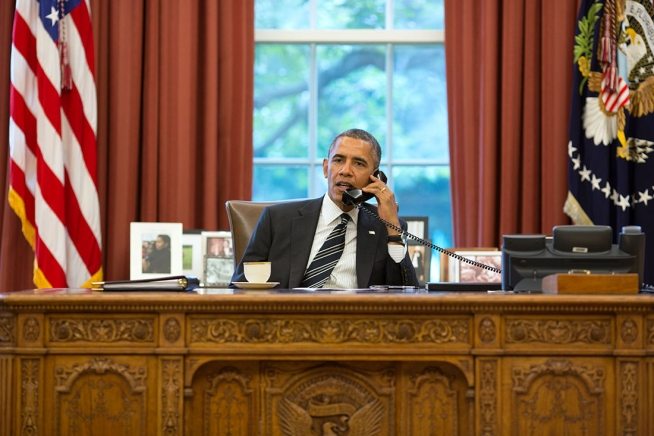The already contentious net neutrality issue became even more so this week as the president laid out his thoughts on the subject, which drew threats of legal action from at least one telecom company.
President Barack Obama this week seemingly threw his support behind the Federal Communications Commission’s moving forward with bringing Internet access under the 1996 Telecommunications Title II regulations, which would mean the FCC could regulate Internet services as a public utility. The FCC is currently in the process of wading through millions of public and industry comments on the topic, with the most recent chatter indicating the agency has pushed off a final decision until next year.
“We cannot allow Internet service providers to restrict the best access or to pick winners and losers in the online marketplace for services and ideas,” Obama noted in a statement on the issue. “That is why today, I am asking the Federal Communications Commission to answer the call of almost 4 million public comments, and implement the strongest possible rules to protect net neutrality.”
In his comments, Obama laid out what he called “bright-line” rules that he has asked the FCC to integrate into its net neutrality plans. Those include preventing an Internet service provider from blocking any content or “intentionally” manipulating network speeds for accessing content. Obama also called for increased transparency when it comes to interconnection between ISPs and the Internet, noting the FCC should make full use of its transparency authority. In addition, Obama stated the FCC should prevent the implementation of paid prioritization for accessing content or for content to run over a broadband connection.
In his comments, Obama also noted that such regulations should be put in place regardless of the connection method, including wireless, though with a caveat.
“The rules also have to reflect the way people use the Internet today, which increasingly means on a mobile device,” Obama noted. “I believe the FCC should make these rules fully applicable to mobile broadband as well, while recognizing the special challenges that come with managing wireless networks.”
The net neutrality proceedings are seen to be especially important for mobile operators, which to this point have not been the central target of updated regulations. The FCC in 2010 released net neutrality rules that allowed for “reasonable network management” from wireless carriers, noting that wireless networks were more easily impacted by network traffic compared with wired Internet connections. That impact comes from the amount of wireless spectrum a carrier has to carry data traffic.
However, consumer demand for wireless services have begun to out-strip the spectrum capacity of some operators. Wireless operators have been forced to manage network access by either offering capped data plans or by inserting terms and conditions that allow the operator to throttle data speeds should a consumer be deemed as consuming more than his share of resources. Both of those tactics are seen in the wired Internet world as counter to an open Internet policy.
Telecom operators hint at legal action
Verizon Communications came out strongly opposed to Obama’s comments, with the telecom giant basically threatening legal proceedings should the FCC reclassify Internet access under Title II.
“That course will likely also face strong legal challenges and would likely not stand up in court,” the company noted in a policy blog.
AT&T also brought up the possibility of legal proceedings in comments on the topic.
“We feel the actions called for by the White House are inconsistent with decades of legal precedent as well as Congressional intent,” said Jim Cicconi, SEVP of external and legislative affairs at AT&T. “Moreover, if the government were going to make such a momentous decision as regulating the entire Internet like a public utility, that decision is more properly made by the Congress and not by unelected regulators without any public record to support the change in regulation. If the FCC puts such rules in place, we would expect to participate in a legal challenge to such action.”
Further comments came from numerous sources, with nearly all falling into the expected side: consumer groups applauded Obama’s comments, while industry supporters opposed. Wireless trade association CTIA, as expected, came out against the move toward invoking Title II oversight.
“Imposing antiquated common carrier regulation … on the vibrant mobile wireless ecosystem would be a gross overreaction that would ignore the bipartisan views of members of Congress and the FCC, would impose inappropriate regulation on a dynamic industry and would threaten mobile providers’ ability to invest and innovate, all to the detriment of consumers,” explained CTIA President and CEO Meredith Attwell Baker. “CTIA strongly opposes such an approach.”
The most recent dance around the net neutrality issues is tied back to earlier this year when The United States Court of Appeals for the District of Columbia ruled against the FCC in how it was looking to regulate Verizon Communications’ business model for delivering broadband services.
FCC Chairman Tom Wheeler has since attempted to broker some form of agreement that would appease both sides of the issue with little luck. Wheeler acknowledged that he held beliefs similar to Obama’s on net neutrality, and touched on a number of initiatives the FCC is looking at in finding a solution, including recently proposed “hybrid” approaches that would include a mix of Title II and the current Section 706 that provides the FCC with authority to tackle policies that could hinder Internet access.
“The reclassification and hybrid approaches before us raise substantive legal questions,” Wheeler noted. “We found we would need more time to examine these to ensure that whatever approach is taken, it can withstand any legal challenges it may face.”
Bored? Why not follow me on Twitter

